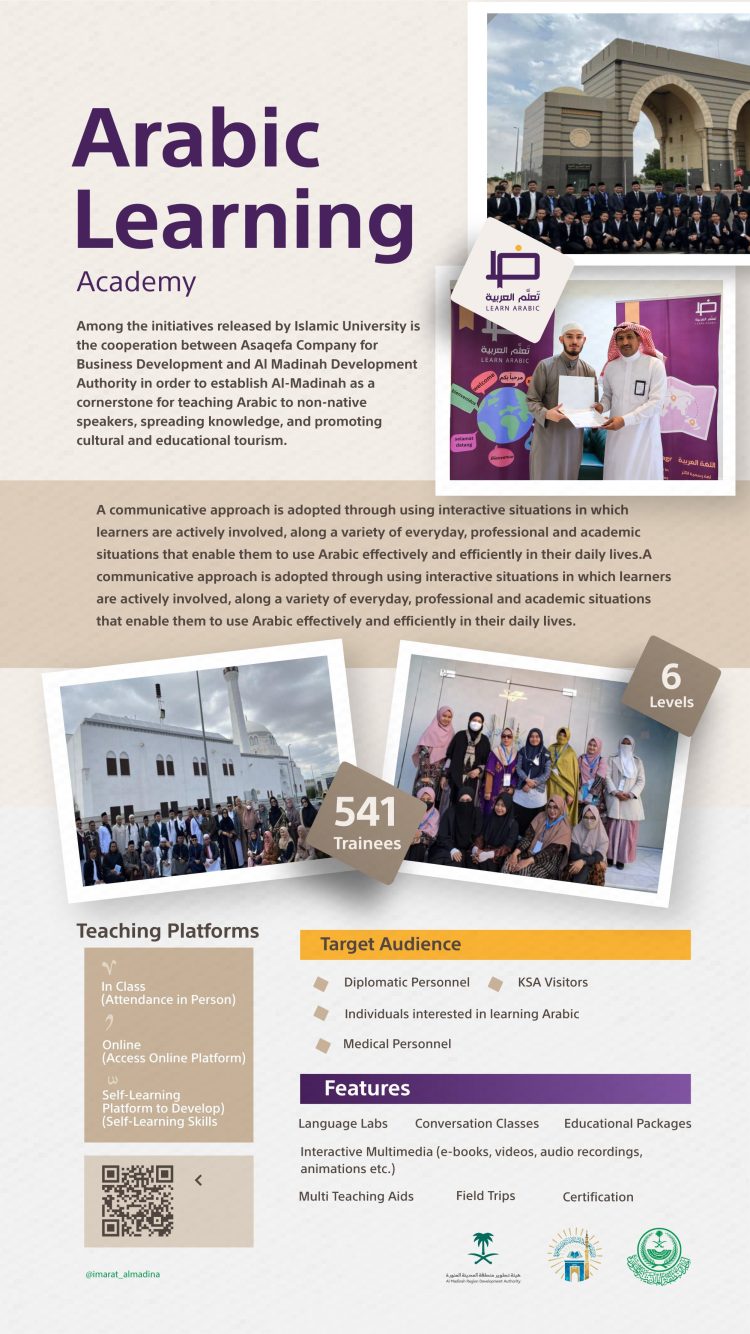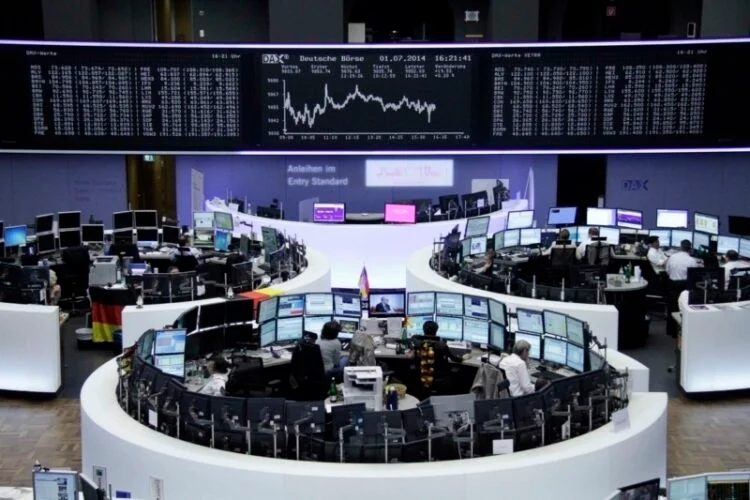Publisher: Maaal International Media Company
License: 465734
Learn Arabic: Madinah’s Emerging Role as an Economic Hub for Educational Tourism
اقرأ المزيد
The Madinah Region Development Authority has introduced the “Learn Arabic” initiative, a specialized program designed to teach the Arabic language to non-native speakers. This program is a pivotal step towards transforming Madinah into a comprehensive economic hub for cultural and educational tourism, attracting millions of global visitors.
Launched within the vibrant heart of Madinah, this initiative embodies the essence of Saudi Arabia’s progressive spirit, drawing from various dimensions rooted in the nation’s comparative advantages, thereby enhancing its competitiveness across all economic sectors. The “Learn Arabic” program is set to capitalize on the city’s existing annual influx of approximately 12 million visitors and aims to expand this number to a remarkable 30 million visitors annually within the next six years.
His Royal Highness Prince Faisal bin Salman bin Abdulaziz, Governor of Madinah, commended the Islamic University for its dedicated efforts in teaching the Arabic language to individuals from various countries around the world.
On a previous occasion, he emphasized that the university’s international programs aimed at instructing non-native speakers in the Arabic language could be considered one of the institution’s most significant historical contributions. Simultaneously, he underscored Madinah’s readiness to welcome individuals from diverse countries worldwide, not solely for the pursuit of academic degrees such as bachelor’s, master’s, or doctorates, but to immerse themselves in a year of Arabic language learning within the city.
Arabic, the language of the Holy Qur’an, revealed to our revered Arab Prophet, holds immense significance. Moreover, a substantial portion of the Qur’an’s chapters was revealed in Madinah, making it the most fitting host for such language programs.
Engineer Fahad Albulihshi, Mayor of the Madinah Region and CEO of the Madinah Region Development Authority, highlighted the cultural and tourism significance of programs like this via his Twitter account. These programs are poised to elevate Madinah into a hub of educational tourism, particularly for those seeking to learn Arabic as non-native speakers. This endeavor carries significant cultural implications that promise a positive economic impact for the nation.
According to numerous economists, Madinah boasts unique dimensions and relative advantages that are highly appealing. It holds the distinction of being the first capital in the history of the Islamic world, substantiated by various geographical and historical landmarks, such as Mount Uhud, the Trench, and historic mosques. These factors position Madinah to likely attract an impressive 30 million visitors annually before the end of this decade, marking a substantial increase in visitor numbers. Furthermore, this growth aligns with surrounding economic projects primarily focused on expanding the city’s accommodation capacity to meet the rising demand.
Considering the growing influx of non-Arabic-speaking visitors to Madinah, the Madinah Development Authority has set its sights on attracting tourists, diplomatic missions, and individuals keen on mastering the Arabic language through the “Learn Arabic” program in collaboration with the Islamic University. This program has been meticulously crafted with six proficiency levels, spanning from novice to advanced, each lasting six weeks. Participants dedicate three hours per day, totaling 15 hours of instruction per week. The program equips its enrollees with the practical ability to utilize the Arabic language seamlessly in both their professional and academic endeavors.
This program offers a unique opportunity to learn the Arabic language, emphasizing quality and excellence through an educational curriculum enhanced by cutting-edge global technologies. It aligns seamlessly with contemporary trends in language education programs, thus playing a pivotal role in fostering cultural and educational tourism development and elevating the Kingdom’s international academic standing.
Moreover, this initiative aligns perfectly with the objectives outlined in the Kingdom’s Vision 2030 by serving pilgrims and advancing understanding of economic activities, thereby contributing significantly to the nation’s multifaceted progress.
The program comprises three distinct levels of language proficiency:
Beginner Levels 1 and 2: These levels introduce learners to the Arabic language, acquainting them with its alphabet, grammar, and pronunciation. They provide opportunities for learners to assess their skills by using Arabic in academic and professional contexts, fostering increased confidence in its application.
Intermediate Levels 1 and 2: These intermediate levels build upon learners’ Arabic skills and elevate them to an advanced stage, enabling confident communication in real-world scenarios. The emphasis is on deepening comprehension and fluency by actively engaging in live discussions, exploring topics of interest, and expressing ideas with confidence. Upon program completion, students achieve a higher level of Arabic proficiency, expanding their linguistic and cultural knowledge.
Advanced Levels 1 and 2: Tailored for learners ready to achieve a high degree of fluency in the Arabic language, these levels establish a comprehensive linguistic environment that encompasses all necessary language skills and elements for effective communication. This curriculum is structured across six progressive levels, spanning from beginner to advanced. Graduates of this program will possess the capability to proficiently use Arabic in their daily professional and academic lives.
This program revolves around immersive communicative experiences, encompassing everyday, professional, and academic scenarios that empower learners to apply the language in real-life contexts. It offers a comprehensive educational portfolio, study laboratories, e-books, technical resources, open chat sessions hosted in the university library, access to lectures, and convenient transportation services for participants traveling between the university and the Prophet’s Mosque throughout the program’s duration.
Educational tourism has emerged as a compelling driver of the region’s economy, establishing itself as a newfound cornerstone of its investment appeal. Madinah is set to become a hub for language education, much like Western cities have been recognized for attracting English learners. For Arabic language enthusiasts, the Islamic University represents a crucial academic component in their educational journey. However, this program extends beyond the university, offering a range of options, including immersion in Al Madinah’s local families, spending daily hours in youth hostels or cafes, and exploring various shops.
These diverse choices are poised to catalyze a fresh wave of economic activity, benefitting not only the offices catering to learners but also the residences hosting them and the businesses drawing their attention. This transformation promises to invigorate the local economy significantly. On the cultural front, it signifies a return to an age-old role for Madinah, where language learners once again find a home within its vibrant cultural fabric.
This educational initiative is poised to bring about substantial benefits across various sectors in Madinah. These sectors include real estate, services, libraries, and transportation, with the introduction of a novel economic component: the opportunity for local families to host learners from around the world who aspire to learn Arabic. This development mirrors the economic models observed in renowned educational cities such as London, Edinburgh, Kuala Lumpur, and others, where the practice of hosting learners at homes has thrived in teaching and mastering languages for non-native speakers.
It’s worth noting that Madinah had previously undertaken an initiative to teach the Arabic language, which was implemented both at the Islamic University’s premises and beyond the Kingdom’s borders. This initiative successfully served over 600 beneficiaries hailing from 10 different nationalities, showcasing its international reach and impact.
Previous program statistics indicate a diverse group of participants, with a wide range of nationalities benefiting from the program:
East Asian countries: 282 beneficiaries from Malaysia, 180 from Indonesia, 30 from Australia, 12 from Tanzania, and over 30 beneficiaries from Kazakhstan, the United States, and Europe.
Total nationalities: More than 170 nationalities have participated in the program up to the end of 2023.
Gender distribution: The program boasts a 60% female participation rate, with more than 30 female learners.
The program offers three distinct tracks, providing flexibility in language learning:
Attendance Track: This track comprises three categories with an average of 15 study hours per week, priced at 600 Saudi riyals.
Interactive Distance Track: This option spans six weeks of study, with a cost of one thousand Saudi riyals.
Self-Paced Track: Extending over 12 weeks of study, this track is priced at 1,350 thousand Saudi riyals and includes various open study hours, benefiting over 10,000 students.
Additionally, the Learn Arabic Program offers a training course for Arabic language teachers catering to speakers of other languages outside the Kingdom. The training course is valued at 1,125 thousand Saudi riyals per trainee, with an average of 32 training hours.








